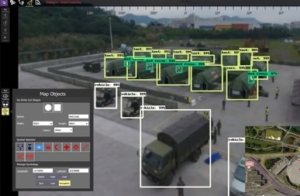TASDCRC Activity on Ethics and Law of Trusted Autonomous Systems
Human machine teaming with Robotic, Autonomous Systems and Artificial Intelligence (RAS-AI) will be a key capability in the future of Australian Defence systems. RAS-AI may increase safety for personnel, removing them from high-threat environments; increase the fidelity and speed of human awareness and decision-making; and reduce the cost and risk to manned platforms. This RAS-AI investment must be informed by ethical and legal considerations and constraints.
Figure 1. Engineers Australia has awarded Athena AI as an engineering breakthrough that has the ability to identify protected objects, people and symbols, such as hospitals, in near real time for military operations using computer vision at very high probabilities. A funded TASDCRC project led by Cyborg Dynamics Engineering and Skyborne Technologies
In 2019, the Trusted Autonomous Systems Defence CRC (TASDCRC) commenced a six-year Programme on the Ethics and Law of Trusted Autonomous Systems valued at $9M. Over the past two years the activity has conducted workshops, engagements and consultation with participants and stakeholders of the Centre, contributing to ADF strategy, producing diverse publications and influencing the design of trusted autonomous systems such as the game-changing Athena AI ethical and legal decision support system—see Figure 1.
The Trusted Autonomous Systems affiliate researchers and employees participate in a wide range of events in consideration of the ethics and law of RAS-AI such as ICRC, UNIDIR SIPRI, and NATO.
TASDCRC is a non-government participant in the United Nations (UN) Group of Governmental Experts (GGE) on Lethal Autonomous Systems (LAWS) to ensure the development of autonomous systems accord with ethical principles, the laws of armed conflict (LOAC) and in abidance with Article 36 weapons reviews.

Law and the Future of War, University of Queensland
The University of Queensland Law and the Future of War Research Group continues to lead research to develop and promote a better understanding of international law that governs the use of trusted autonomous systems (TAS) by the Australian Defence Organisation. It further aims to contribute to the development of law, policy and doctrine to ensure that Australia’s reliance on trusted autonomous systems satisfies both humanitarian imperatives and national security interests and is consistent with Australia’s commitment to upholding international law.
Ethics Uplift Program
From February 2021, the TASDCRC Ethics Uplift Program (EUP) will offer immediate and ongoing assistance to Centre participants through consultation, advice and policy development, supported by case analysis, education and enculturation.
The objectives of the program are to:
- Raise the level of knowledge, skills and application of ethics.
- Build enduring ethical capacity in Australian industry and universities to service Australian RAS-AI.
- Educate in how to build ethical and legal autonomous systems.
- Achieve ethical RAS-AI for TASDCRC Projects and
- Support and contribute to the development of national policy.
The program will provide Australian industry access to the best of Australian theoretical and pragmatic expertise via universities and consultancies grounded in Defence-suitable methodologies and frameworks. The continued investment by TASDCRC with Defence and other participants is intended to accelerate and foster a sustainable capability for ethical and legal sovereign RAS-AI in Australia.
To express interest in provision of services to the EUP, contact Chief Scientist Dr Kate Devitt via info@tasdcrc.com.au


